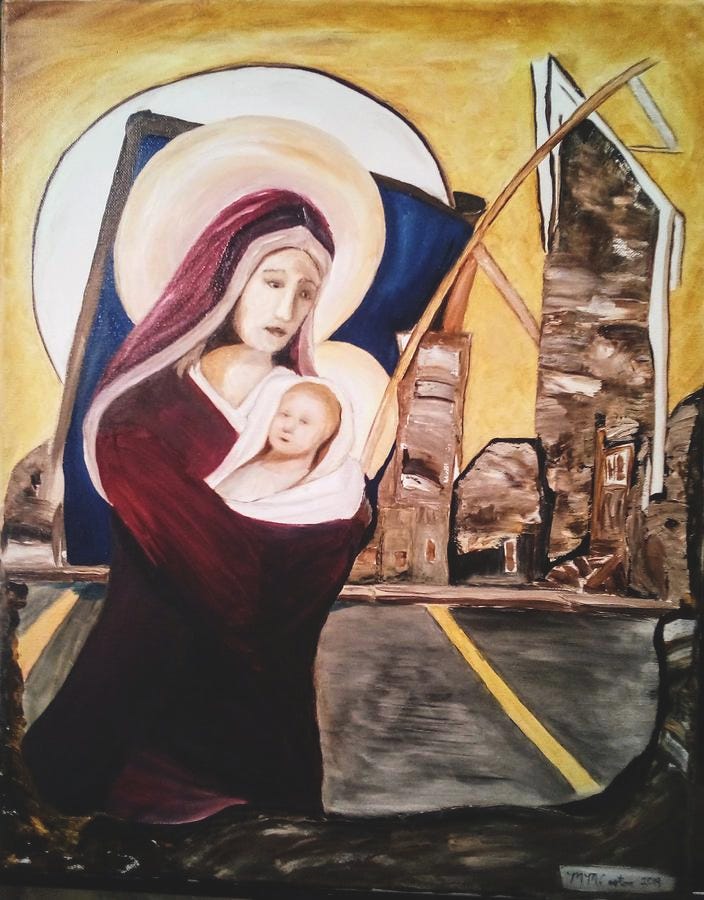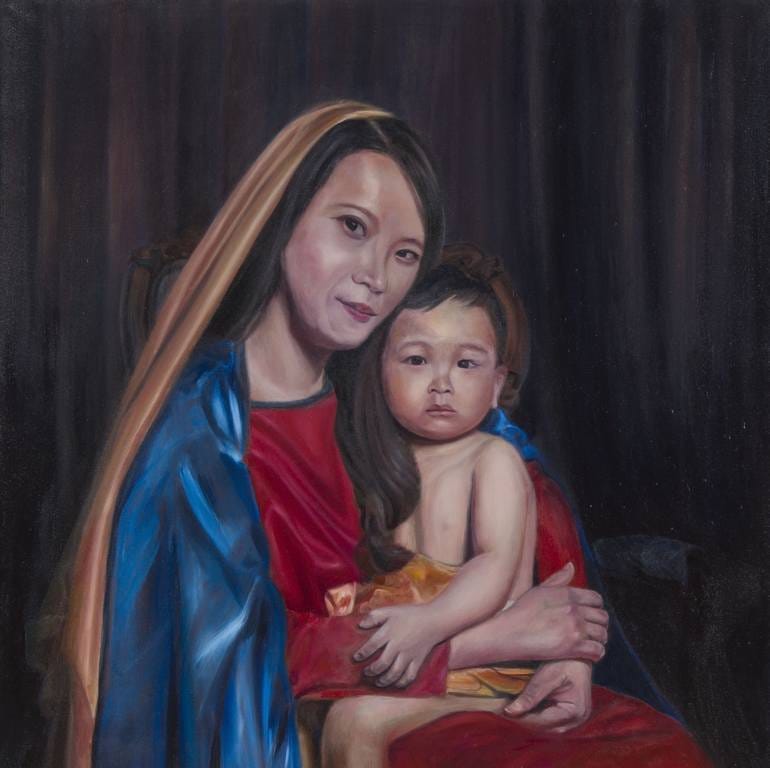Here is the world. Beautiful and terrible things will happen. Don’t be afraid.
Advent Day 24: Mary of Nazareth
In the span of twenty verses in Luke, Mary is called blessed and favored five times, first by Gabriel then by her cousin Elizabeth and, finally, in her own spontaneous musical outburst, The Magnificat. And while it’s possible Mary felt blessed from the moment she conceived Jesus, it’s more likely it took some convincing. Indeed, her first reaction when Gabriel calls her blessed is to be greatly troubled (Luke 1:26-38). So, it’s not hard to imagine a scenario where this as-yet-unmarried, pregnant teen just finally threw up her hands and gave in to what everyone was saying about her. I mean, if everyone’s saying you’re blessed, then it must be true. Right?
But if it did take some convincing for Mary to believe she was blessed—or if she needed some time to work out her feelings on the nature of blessing itself—it’s not hard to see why.
Consider Mary’s life. Though she would often later be depicted in Renaissance paintings as a plump and pale sweet lass, the real Mary hailed from decidedly gritty circumstances. Her hometown, Nazareth, was a dusty, scorned backwater (John 1:45-46) occupied by a foreign army that taxed and terrorized the local population into submission. Life was short and harsh. As such, marriage was forced on the young in hopes of extending family lines. When Mary first appears in the gospels, she may have been as young as thirteen, the age most women married in ancient Israel.
So, Mary is to be forgiven if she returned Gabriel’s greeting with some skepticism.
Blessed? Who? Me?
After trying to calm Mary’s very understandable fear, Gabriel makes his pitch: God would like Mary to bear a child who will one day become a great leader. In response to Mary’s question about how this could happen, Gabriel replies mysteriously that the power of God will rest upon her. Then Gabriel waits while Mary considers.
When Mary gives her consent, it is by speaking the Hebrew word hineni—here I am. This is no mere agreement to a plan, no signing initials next to a clause on a contract, but a bold announcement of her readiness and willingness to enter into Mystery. Something vast, primordial and true is being offered and she agrees to receive it. This is Mary’s first awakening into the mystical life.
Hineni has deep spiritual meaning in Jewish theology. According to Rabbi Nina Beth Cardin:
…hineni is a response of sacred and undiluted presence, a response in which the self sheds all reservations, which expands the boundaries of self, indicating a readiness to receive and respond to whatever experience is about to unfold. It is brave and humble.
When Mary gives this response, she is not agreeing to be a passive instrument. Rather, she offers herself in all her courage and vulnerability as a creative partner in God’s wild plan to reveal Love in the world. And she does this with no details, assurances or guarantees—only her trust that God is with her.
Note that a hineni affirmation does not come without fear. We can all relate to just how scary showing up for life can be. Moses, notably, tried to walk back his hineni, after realizing what he was being called to do (Exodus 3:9-12). And, surely, there were many times in the months after Gabriel’s visit that Mary would have traded her Yes for an On second thought, I’ll take a pass, and a return to the predictable life she’d once known.
Just breaking the news of her pregnancy to Joseph would have come with great risk, considering the punishment for adultery was stoning. And even though, thanks to his own angelic vision, Joseph comes to trust his fiancée, it is highly unlikely that Mary’s pregnant-by-the-Holy-Spirit story passed muster with their neighbors. The social stigma may have had as much to do with them fleeing to Bethlehem as a census. Then, in Bethlehem, Jesus is born, not in a safe and sanitary room, but a stable.
The journey to that point was difficult and dangerous. But now, in this one moment, angels sing and shepherds bow, and there is the thrill of Hope as the weary world rejoices. As the song goes, a soul felt its worth. And Mary, like the mystic she is, holds the experience in its fullness deep in her heart (Luke 2:8-20)—the good parts and the bad.
Up to that last little bit of the story, none of this sounds like a blessing any of us would want. None of it fits the standard definition of highly favored. We think of celebrities and royalty as highly favored. People with money, beauty and privilege. Not teen moms giving birth among the oxen. And maybe Mary was confused too. But probably not. She’d had nine months to plumb the depths of the Mystery growing in her, and to stretch her ideas of what a blessing looks like.
A clue to the state of her heart comes in the next part of the story. Forty days after Jesus’s birth, Mary and Joseph present Jesus at the temple, as prescribed by Jewish law. There they meet an old man named Simeon who blesses (another blessing!) Jesus, Mary and Joseph and makes a prediction that the child Mary holds in her arms will, indeed, be a great man. But then Simeon’s prophecy grows dark as he foretells that many will also oppose Jesus, and pain will pierce Mary’s heart and soul on account of her son (Luke 2:21-35).
Many would shrink back in fear or beat a hasty retreat if someone predicted such things about their child. But Mary doesn’t run or write Simeon off as a kook. Instead, she receives the moment, and all the moments that will come with being a mother, woman and human—beauty and terror, joy and sorrow—and she holds these things deeply in her unguarded heart.
She sits with the Mystery and awe, rejecting none of it. And often in the years ahead she will recall her night visit from Gabriel, and the angel’s promise that the power of God would rest upon her. This confused her at the time. She didn’t know what Gabriel meant. But now she understands: God’s power upon her is His presence with her. She will not be spared the tragedies of life, she will not be given a pass on heartbreak. But she will be held by God’s Presence that is in all, through all, forever, no matter what.
So this is what it is to be blessed and favored: not money, fame or success; not being spared cancer, divorce, death, doubt, shame, guilt and loss; but to know that even in brokenness, God’s presence with you is never broken, as you carry Love, birth Love, then send your Love out into the world where you walk with it no matter where it takes you…even when it takes you right up to the foot of the cross.
Practice
Today’s practice is a complement to yesterday’s: think of a Mary-figure from your life. This can be, but doesn’t have to be, your own mother. It can also be an aunt, an older friend, teacher, coach, etc.—anyone who has nurtured you and helped you grow. Spend time today journaling or praying gratitude for the fact that you have had this person in your life.
Holidays at Life In The City
All in-person gatherings listed below happen at 205 East Monroe St. in Austin, Texas.
Dec. 8, 11:15 am: LITC’s original musical, Make Room In Your Heart. Dec. 21, 6:00 pm: Blue Christmas, an intimate service for the longest night. Dec. 23, 6:00 pm: Our annual Christmas Eve-Eve service. Dec. 29, 11:15 am: Welcome 2025 with a fun, casual service that includes coffee, cookies, conversation and resolution-making.
Contemplation In The City
Life In The City’s contemplative community meets regularly to practice sacred traditions like Lectio Divina and Centering Prayer. If you’re in Austin, consider joining us. Upcoming in-person gatherings are Jan. 14, Feb. 4, Mar. 4, Apr. 8, May 6. We meet at 205 East Monroe Street in Austin. Doors open at 6pm for coffee and conversation, service from 7-8pm. You might also find meaning in our monthly newsletter in which we wrestle with how to live a spiritually engaged life in the modern world. Read more here.
Ready For More?
Read the Introduction to the 2022 edition, to find out how my experience of September 11, 2001 became my gateway to Advent.
Find more mystics, saints and prophets in our Archive.
Feedback
Catch a typo? Have suggestions for mystics, saints and prophets for a future year? Leave feedback in the Comments below or email Greg Durham at greg@litcaustin.org.










Hineni! Here I am! I love this word and all that comes with it - courage and fear, willingness to do God’s will but also the recognition that that this is bigger than you, an expansion of identity accompanied by the power of God! Thank you for sharing these meditations, Greg!
Very beautiful as well as the images. Thanks also for recommending the Pauli Murray documentary. Wonderful! How did I never know her name? This has been a brilliant series I've enjoyed twice now. Thank you again so much.